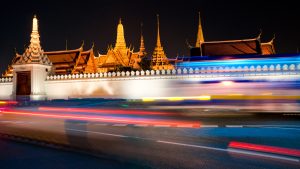A Thai journalist and freelance photographer have been arrested for reporting on an incident in which a political activist vandalized a Bangkok temple, according to media reports.
Prachatai, an independent online newspaper, told the AFP news agency that its reporter Nuttaphol Meksobhon was arrested as an “accomplice” to the incident last March, in which a man spray-painted an anarchist symbol and the number 112 with a line through it on the outside wall of Wat Phra Kaew.
A video of the incident went viral, and prompted an upsurge in online anger, given that the temple is part of the Grand Palace complex. Suttawee Soikham of Khon Kaen, then 24, was subsequently arrested and charged with violating the Cleanliness Act and the Ancient Monuments Act, which together carry up to seven years in prison.
According to a report by Prachatai, Nuttaphol was taken to Chalongkrung Police Station in Min Buri District. He is scheduled to appear in court today, when judges will determine whether to keep him in custody.
In a statement on social media, Prachatai said that Nuttaphol was one of several journalists present at the scene, and was there to fulfill his professional duties. “He went there to do his duty which was covering the news,” the publication’s editor Tewarit Maneechai told AFP. He was quoted elsewhere as saying that the publication “may lodge complaint to related organizations to examine the violations of press freedom.”
Prachatai later reported that a freelance photographer, identified as Natthaphon Phanphongsanon, who covered the incident, was also arrested and was being held at a separate police station.
The number 112 was a reference to Article 112 of the Thai penal code, known commonly as the lese-majeste law, which criminalizes any criticisms of the monarchy or the king.
Dissident political activists and human rights groups argue that the law has been used for years to clamp down on dissent, and its reform or repeal has become a key demand of Thai progressives. The campaign to abolish Article 112 emerged from the youth political movement of 2020-21, which also broke the political taboo against questioning the power and prerogatives of the throne.
The demand subsequently became a key part of the platform that the progressive Move Forward Party (MFP) took to last year’s election. The party ended up winning the most seats in Parliament, but was blocked from forming government by the opposition of the military-appointed Senate, in large part because of its pledge to reform the lese-majeste law.
The political taboo around the monarchy is so sensitive that even the mildest comments related to the subject – such as honking at a royal motorcade or affixing a sticker to a portrait of the king – can lead to hefty prison terms under Article 112. The law has also unsurprisingly been used to punish youth protest leaders who called for reforms to the monarchy during large protests in 2020 and 2021. Indeed, since late 2020, at least 262 people have been charged with lese-majeste, according to the advocacy group Thai Lawyers for Human Rights.
Interestingly, the two media workers are not being charged with lese-majeste, but for being “accomplice to damaging a historic site and vandalizing a wall in a public place.” Nonetheless, their arrest reflects the continued narrowing of the space for permissible dissent in Thailand. As the Thai Enquirer noted in an editorial today, Nuttaphol’s arrest “is the latest in a series of events that underscore the precarious state of press freedom.”
The arrests also suggest that while there has been some talk of an amnesty for lese-majeste defendants, activities with even a slim, tangential connection to the monarchy and its symbols are increasingly off limits, and that prosecutors are continuing to wield the law with abandon. Last month, a court extended the prison sentence of one lese-majeste offender to a record 50 years for social media posts deemed damaging to the king.
Not long afterward, the Constitutional Court ordered the MFP to stop its campaign to reform the lese-majeste law, saying that it amounted to an attempt to overthrow the country’s system of constitutional monarchy. Ruangkrai Leekitwattana, an ultra-royalist lawyer and activist, subsequently filed a petition with the Election Commission, seeking the dissolution of the MFP.
While these prosecutions may succeed in quashing criticisms for a time, Thai politics appears to be locked into a dynamic whereby conservative overreach is followed by more radical critiques and demands for reform. If this pattern continues, the number of people questioning the official mythologies will continue to grow.
As Saksith Saiyasombut, the Thailand correspondent for Channel News Asia, put it on X (formerly Twitter) yesterday, the recent prosecutions appear to have emboldened ultra-royalist elements to be more “ferociously protective” of the royal institution. However, he added, they “may end up achieving the opposite of what they want.”

































